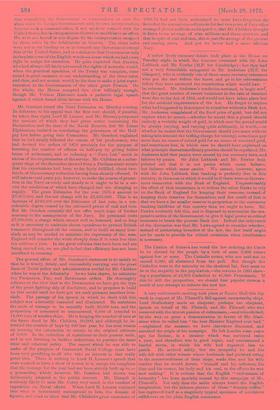Mr. Goschen stated the Navy Estimates on Monday evening. In
deference to his appeal that the first vote should, if possible, be taken that night, Lord H. Lennox and Mr. Brassey postponed the motions of which they had given notice concerning the Devastation and the state of the Naval Reserve, but Sir James Elphiustone insisted on ventilating the grievances of the Half- pay List before going into Committee. Mr. Goschen explained that he had simply followed the • course of his predecessor, who had- devised the orders of 1870 precisely for the purpose of lessening the number of officers on half-pay by giving better terms of retirement, and so reducing a "Navy List" much in excess of the requirements of the service. Mr.-Childers at a subse- quent stage of the discussion showed from a Parliamentary return that his expectations had been so far fairly fulfilled, about two- thirds of. the necessary reduction having-been already effected. It will take several years yet, however, to make the course of promo- tion lathe Navy as ready and steady as it ought to be in a son. vice the eonditions of which have changed and are changing so rapidly. The gross Estimates for the . year 1873-4 amount to /9,873,000, and the net charge will be /9,633,000. This is an increase of £340,000 over the Estimates of last year, in a con- siderable degree caused by -the enhanced prices of coal and iron. But Mr. Goscheit certainly, did not offer much hope of further economy in the management of the Navy. Its -personnel costs 17,000,000, a charge which cannot well. be lessened, and so long as it is necessary to maintain eleven squadrons to protect British commerce throughout all the. oceans, and to build as many iron- clads as may be needed to maintain -the supremacy of the. seas, England will consider the-work cheaply done if it costs less than- ten millions a year. In the great reforms that have been and are being carried out, we ®lad to feel that efficiene,y has not been sacrifioed to economy.






































 Previous page
Previous page